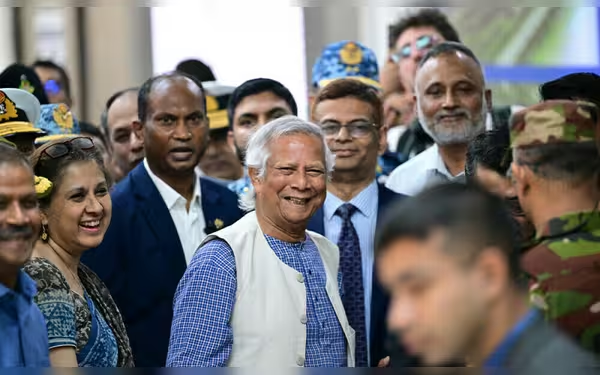Saturday, November 16, 2024 07:51 PM
Yunus Declares No Elections in Bangladesh Without Reforms
- Yunus insists on reforms before holding elections.
- Political unrest leads to former PM Hasina's removal.
- Judicial system reforms promised for impartial trials.
 Image Credits: brecorder
Image Credits: brecorderMuhammad Yunus states elections in Bangladesh will only occur after essential reforms are implemented, following political upheaval.
In a significant development in Bangladesh, interim leader Muhammad Yunus has made it clear that elections will not take place until essential reforms are implemented. This statement comes in the wake of the recent political upheaval that led to the removal of former Prime Minister Sheikh Hasina, who had been in power for 15 years. Yunus, a Nobel Peace Prize laureate and renowned microfinance pioneer, was appointed as the country’s chief advisor following a student-led uprising that demanded change.
Yunus, now 84 years old, is at the helm of a temporary administration tasked with the daunting challenge of restoring democratic institutions in Bangladesh. In an interview, he emphasized the importance of reforms, stating, "Reforms are pivotal. If you say, hold the election, we are ready to hold the election. But it would be wrong to hold the election first." This highlights his commitment to ensuring that the electoral process is fair and just, rather than a mere formality.
The backdrop to Yunus's leadership is a troubling history marked by widespread human rights abuses during Hasina's tenure. Reports indicate that over 600 individuals lost their lives in the violent weeks leading up to her ouster, with allegations of mass detentions and extrajudicial killings of political opponents. The former government was also accused of manipulating the judiciary and civil service to maintain its grip on power, raising serious concerns about the integrity of democratic processes.
Yunus described the public administration system he inherited as "completely broken down," necessitating a comprehensive overhaul to prevent a return to autocratic rule. He firmly stated, "Reforms mean we will not allow a repetition of what happened in the past." This commitment to reform is crucial for rebuilding trust in the government and ensuring that the mistakes of the past are not repeated.
Despite facing criticism for the arrests of numerous politicians and police officers loyal to Hasina, Yunus has assured the public that any criminal trials will be free from government interference. He stated, "Once the judicial system is reformed, then the issues will come forward, about who will be placed on trial, how justice will be carried out." This promise of impartiality is vital for restoring faith in the judicial system.
Moreover, the situation for journalists in Bangladesh remains precarious. At least 25 journalists, perceived as supporters of Hasina's regime, have been arrested for alleged violence against protesters. The press watchdog Reporters Without Borders has condemned these actions as "systematic judicial harassment." Yunus has encouraged open criticism, stating, "Criticise. Unless you write, how will we know what is happening or not happening?" This call for transparency is essential for a healthy democracy.
As Bangladesh navigates this critical juncture in its political landscape, the emphasis on reforms before elections is a step towards ensuring a more democratic and just society. The path ahead may be challenging, but with leaders like Yunus advocating for change, there is hope for a brighter future where the voices of the people are heard and respected. The commitment to reform and justice will be the cornerstone of Bangladesh's journey towards a stable democracy.













